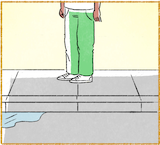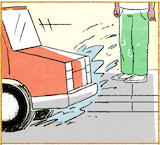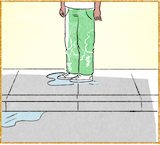


เขากำลังเฮ็ดหญัง เขากำลังยืนอยู่ เขายืนอยู่เทิงฟุดบาด
ฟุดบาดข้างถะหนนนั้นหละ เป็นหม้องทางญ่างเนาะ เป็นหม้องญ่าง อยู่ข้างหนทางนั้นหละ เขากำลังยืนอยู่หั้น ยืนอยู่พุเดียวข้อหล้อ จักว่าเขายืนเฮ็ดหญัง
9
เกิดอี่หยังขึ้นตอนนี้ กะคนวั่งหั้นหละ คนที่เฮาเว้าฮอดวั่งหั้นหละ ที่เขากำลังยืนอยู่เทิงฟุดบาด ยืนอยู่พุเดียวนั้นหละ เขากำลังยืนอยู่
แล้วกะมีลดคันหนึ่ง ขี่ผ่านมา เป็นลดเก็งดอก เหยียบน้ำบัดหนิ เหยียบน้ำฟ้งใส่เขา ฟ้งใส่พุซายคนนั้นหละ เปียกเบิด เปียกส้งเขาเบิดบัดหนิ
แล้วน้ำหม้องที่ลดคันนี้เหยียบหนะมาแต่ใส จักเลว จักว่าน้ำอันนี้มันมาแต่ใส ฝนอาดสิตก กะเลยน้ำมาข้อนอยู่หนี้กะได้ หลือว่าคนสิเอาน้ำมาเทไว้หนี้กะได้ เฮากะบ่ฮู้จักนำว่าน้ำอันนี้มันมาแต่ใส
10
เกิดอี่หยังขึ้นตอนนี้ กะลดคันวั่งหั้นหละมันขี่ผ่านไป เหยียบน้ำฟ้งใส่ส้งเขา ส้งเขากะเปียกเบิดนั้นตั๊วะบัดหนิ จักเขาสิเฮ็ดหญังต่อไปแล้วเด้อ ฮู้แต่ว่าเขากำลังยืนโจ่โล่อยู่พุเดียวคือเก่านั้นหละ
แล้วคือฮู้ว่าส้งของเขาเปียก กะฮู้ตั๊วะ ส้งมันเป็นสีเปียกๆ เนาะ เบิ่งแล้วส้งกะเปียกคักๆ แล้วนั้นหนะ น้ำกะเต็มส้งเขาอยู่ ญ้อยลงมาเต็มเกิบเต็มส้งเขาอยู่
Link to overview page
Link to dictionary
| Isaan | Pronunciation | Tones | Thai | English/Notes |
|---|---|---|---|---|
| เขา | khao | M | เขา | personal pronoun: he, she |
| กำลัง | gam-laŋ | M-HR | กำลัง | auxiliary indicating continuous or progressive action |
| เฮ็ด | het | H | ทำ | to do, to make |
| หญัง | ɲaŋ | M | อะไร, เป็นหญัง = ทำไม | 1. what {เขากำลังเฮ็ดหญัง = What is he doing?} {ธูปเอาไว้เฮ็ดหญัง = What are incense sticks for?} 2. something, anything, (nothing) 3. เป็นหญัง[...]คือ in initial position: why {เป็นหญังเขาคือใส่บักพิกลงไปในกวยเตียว = Why is he putting chili in [his] noodle soup?} {เป็นหญังหน้าต่างมันคือเปิด = Why is the window open?} {เป็นหญังมันคือมีควนไฟ = Why is there smoke?} |
| ยืน | yʉ:n | M | ยืน | to stand |
| อยู่ | yu: | H | อยู่ | 1. to be (located) at 2. yet, still 3. auxiliary indicating continuous or progressive action {ทอดปาอยู่ในกะทะ = (in the process of) frying a fish in the pan} {แม่กำลังเมี้ยนเฮียนอยู่ = mother is cleaning/tidying up the house} |
| เทิง | thə:ŋ | HR | บน | 1. on, on top of, at, in {เทิงโต่ะ = at/on the table} {กบมันนั่งอยู่เทิงใบบัว = the frog is sitting on the lotus leaf} {เทิงท้องฟ้า = in the sky} {มันแล่นอยู่เทิงลาง = [the train] runs on rails} {มีคนนั่งอยู่เทิงลดสามล้อสามคน = there are three people sitting in the tuk tuk} 2. up, upward Notes: pronunciation: also realized as ทัง |
| ฟุดบาด | fut-ba:t | H-LF | ฟุตบาท | sidewalk |
| ข้าง | kha:ŋ | LF | ข้าง | 1. side {มีหูจับสองข้าง = there are handles on both sides} 2. next to {วางอยู่ข้างๆ ก่องใบใหญ่ = it's placed next to the large box} {เขายืนอยู่ข้างๆ อีกพุหนึ่ง = he's standing next to another person} 3. clf. for body parts which come in pairs (eyes, ears, legs etc.) {เขามีตาสองข้าง = she has two eyes} |
| ถะหนน | tha-non | M-M | ถนน | road, street |
| นั้นหละ | nan-la | HF-M | นั่นแหละ | auxiliary for emphasis at the end of a phrase |
| เป็น | pen | M | เป็น | 1. to be, to exist 2. to be able to 3. to suffer, sth. happens to 4. เป็นหญัง[...]คือ in initial position: why? {เป็นหญังเขากะคือแปงฟัน = Why is he brushing his teeth?} {เป็นหญังเคี่ยงบินมันคือสิตก = Why is the airplane falling down?} |
| หม้อง | mɔŋ | LF | ที่, แห่ง, บริเวณ | 1. place, area {หลายที่หลายหม้อง = in many places} {หม้องใดหม้องหนึ่ง = some place} 2. clf. for places |
| ทาง | tha:ŋ | HR | ทาง | 1. way, direction {พุหญิงกะสิไปทางหนึ่ง พุซายกะสิไปอีกทางหนึ่ง = the woman goes one way, the man another way} {ตะเว็นไปทางใด = Where has the sun gone?} {เขาถีบจักกะย๊านไปทางหน้า = he's biking on/onward/forward} {มาเว้า มาว่าเฮาในทางที่บ่ดี = he's scolding [me], he's talking to me improperly} 2. by, through, via etc. {เว้าทางโทละสับ = to talk on the phone} |
| ญ่าง | ɲa:ŋ | H | เดิน | to walk {เขากำลังญ่างเว้ากัน = they are walking and talking} {ลูกเป็ดญ่างไปนำแม่เป็ด = the ducklings are [walking] following their mother} {เขากำลังญ่างข้ามสะพาน = she's walking over the bridge} {เขาสิญ่างไปใส = Where is he going?} |
| เนาะ | nɔ | H | เนาะ | final particle: makes the statement softer, looking for agreement |
| หนทาง | hon-tha:ŋ | M-HR | ถนน | road, street, way |
| หั้น | han | LF | ที่นั่น | there, over there |
| พุเดียว | phu-di:ao | H-M | คนเดียว | 1. alone, by oneself {เขากำลังยืนอยู่พุเดียว = she's standing by herself} {เขานั่งอยู่พุเดียว = he's sitting by himself} 2. one person |
| ข้อหล้อ | khɔ:-lɔ: | LF-LF | เท่านั้น, ขนาดนั้น, น้อยๆ | only {ต้นไม้มีต้นเดียว ต้นเดียวข้อหล้อ = there's one tree, only one tree} {มีบ้านหลังเดียวข้อหล้อ = there's only one house} |
| จัก | jak | M | จัก | 1. answer to a question: [I] don't know, don't know exactly, [I'm] not sure {พุซายคนนี้เขาเถ้าไป่ จัก จักเถ้าหลือบ่เถ้า เบิ่งบ่ค่อยออก = Is this man here already old? I don't know. I can't see clearly whether he's old or not.} {เขาเว้ากันอยู่ใส จักคือกัน = Where are they talking? I don't know either.} 2. exact(ly), what exactly {จักต้มอี่หยังกะบ่ฮู้ = I don't know what (exactly) he is cooking} {บ่ลู้คือกันจักปาอี่หยัง = I don't know either what kind of fish this is} 3. how much/many? {ต้นไม้มีจักต้น = How many trees are there?} {ตอนนี้จักโมงแล้ว = What time is it now?} {มือของเฮานี้สิมีจักนิ้ว = How many fingers do our hands have?} 4. a bit, a little bit {จักหน่อย/จักหน่อยหนึ่ง = a bit, a little bit} |
| ว่า | wa: | H | ว่า | 1. that, as {คำว่า X = the word X} 2. to say |
| เกิด | gə:t | LF | เกิด | 1. (often together with ขึ้น) to happen, to arise, to take place {เกิดอี่หยังขึ้น = what is happening?} {บ่มีหญังเกิดขึ้น = nothing's happening} 2. to be born 3. to grow {หนวดกะคือสิเกิดอยู่ใต้ดัง = a moustache grows below the nose} |
| อี่หยัง | i:-yaŋ | H-M | อะไร | 1. what {นี้คืออี่หยัง = What is this?} {มื้อนี้เจ้าเฮ็ดอี่หยัง = What are you doing today?} {กินเข้างายกับอี่หยัง = What did you have for breakfast?} 2. something, anything, (in negations) nothing {บ่ต้องเฮ็ดอี่หยังอีกเลยนอกจากใส่ปุย = [we] don't need to do anything besides adding fertilizer} |
| ขึ้น | khʉn | LF | ขึ้น | 1. to go up, to increase 2. sun: to rise {ตะเว็นกำลังขึ้น = the sun is rising} 3. more 4. bus/train etc.: to get on, to board {พุโดยสานขึ้นลดไฟเบิดแล้ว = all passengers have boarded the train} |
| ตอนนี้ | tɔ:n-ni: | M-HF | ตอนนี้ | now |
| กะ | ga | M | ก็ | 1. then, consequently 2. also |
| คน | khon | HR | คน | person, people |
| วั่งหั้น | waŋ-han | H-LF | เมื่อกี้ | just now |
| หละ | la | M | แหละ, ล่ะ | 1. auxiliary for emphasis at the end of a phrase 2. auxiliary to create a follow-up question: And what about ... ? {แล้วลดคันที่สองหละ = And what about the second car?} |
| ที่ | thi: | H | ที่ | 1. that, which {คนที่ยืนอยู่ฝั่งขวา = the person which is standing on the right = the person standing on the right} {เว้าคำที่บ่สุพาบ = to speak words which are impolite = to speak impolitely} 2. for ordinal numbers {ที่สาม = third} |
| เฮา | hao | HR | เรา | 1. personal pronoun: we 2. personal pronoun: I |
| เว้า | wao | HF | พูด | to say, to speak, to talk |
| ฮอด | hɔ:t | HF | ถึง | 1. to arrive, to attain {ฮอดจุดหมายปายทาง = (airplane, train etc.) to arrive at one's destination} {มันทันได้ฮอดหกโมงอยู่ = it's not yet 6 o'clock} 2. to, at {ผมญาวฮอดบ่าไหล่เอาโลด = long hair down to the shoulders} 3. about {บ่ได้เว้าฮอด = [I] haven't talked about [this]} {คนที่เฮาเว้าฮอดวั่งหั้นหละ = the person we've just talked about} |
| แล้ว | lɛ:o | HF | แล้ว | 1. finished 2. already 3. and then, and next (especially แล้วกะ) 4. auxiliary for past tense |
| มี | mi: | HR | มี | 1. to have 2. there is |
| ลด | lot | H | รถ | 1. car, motorized vehicle 2. vehicle, cart {ลดขายแนวกิน = food cart} |
| คัน | khan | HR | คัน | clf. for cars, trains, motorbikes, boats {ลดไฟคันนี้ = this train} {ลดเก็งคันสีเขียวคันน้อย = a small green car} |
| หนึ่ง | nʉŋ | H | หนึ่ง | 1. one 2. after adjective: intensifier {บักคักหนึ่ง = very much} {อันบักใหญ่หนึ่ง = very large}, or attenuates the meaning {กะดาดมันแผ่นน้อยๆ หนึ่ง = the piece of paper is [relatively] small} |
| ขี่ | khi: | H | ขี่ | to ride, to drive {ขี่มอเตอไซ = to ride a motorbike} {ขี่ควย = to ride on a buffalo} {ขี่เลีย = to take or travel on a boat} |
| ผ่าน | pha:n | H | ผ่าน | to pass |
| มา | ma: | HR | มา | 1. to come 2. auxiliary expressing action towards the present or focal time {กะคุเฮ็ดมาจากอี่หยัง = What is the bucket made of?} {แล้วเขากะเก็บเงินจากพุนั้นมา = and then she takes the money of that person} |
| ลดเก็ง | lot-geŋ | H-M | รถเก๋ง | car (sedan) |
| ดอก | dɔ:k | LF | หรอก, ดอก | 1. particle used after a negative, relativizing or explanatory statement to make the sense milder {กินเข้าบ่ บ่กินดอก = Are you going to eat [with us]? No.} {เป็นก้อนสี่เหลี่ยม ก้อนน้อยๆ ดอก = These are cubes, small cubes.} {แล้วกะมีลดคันหนึ่งขี่ผ่านมา เป็นลดเก็งดอก = And there's a car passing, a sedan.} 2. particle used to emphasize (not necessarily a negative) contrast 3. particle used for emphasis {ดอกไม้นี้งามบ่ กะงามอยู่ เบิ่งงามๆ ดอก = Is this flower beautiful? Yes, it's beautiful, it looks beautiful} |
| เหยียบ | yi:ap | LF | เหยียบ | to step on, to tread on, to run over |
| น้ำ | na:m | HF | น้ำ | 1. water 2. drink, soft drink, juice |
| บัดหนิ | bat-ni | M-M | [...] บัดหนิ = ทีนี้ [...] | final particle: adds a sense of immediacy |
| ฟ้ง | foŋ | HF | กระเด็น | to splash, to splatter |
| ใส่ | sai | H | ใส่ | 1. to put something in/on {เขาใส่บักพิกในกวยเตียวหลาย = he's putting a lot of chili in his noodle soup} {เขาบีบยาสีฟันใส่แปงสีฟัน = he squeezes toothpaste on the toothbrush} {ก่องเอาไว้ใส่ของ = boxes are there to put stuff in} 2. to wear (clothes) {เขาใส่เสี้ยแขนญาว = he's wearing a long-sleeve} 3. directed at {เอิ้นใส่กัน = to call each other/to say to each other} {หมามันเห่าใส่แมว = the dog barks at the cat} {ล้องเพงใส่ไม = to sing into the microphone} {เขากำลังซี้มือไปใส่พุซาย = she's pointing at the man} |
| พุซาย | phu-sa:i | H-HR | ผู้ชาย | man, male |
| เปียก | pi:ak | LF | เปียก | wet |
| เบิด | bə:t/bət | LF/M | หมด | 1. completely, totally, entirely {เทิงเบิด = all of them} {เบิดมื้อเบิดค่ำ = [all] day and night} {ขั้นพุโดยสานลงลดไฟเบิดแล้ว [...] = when all passengers have disembarked […]} {เขากินเบิดบ่ = Has he eaten all of it?} 2. to be finished, to be exhausted, to come to an end, to have no more {โน่ดบุ่กแบ็ดเบิด = the notebook is out of battery/the notebook needs recharging} |
| ส้ง | soŋ | LF | กางเกง | trousers Notes: synonym: กางเกง |
| นี้ | ni: | HF | นี้ | 1. this 2. here |
| หนะ | na | M | final particle | |
| แต่ใส | tɛ:-sai | H-M | จากไหน | where from? |
| เลว | le:o | HR | particle emphasizes negation {กะบ่เลว = no, not at all} {จักเลว = I don't know!} Notes: [Ton] can maybe also carry M tone |
|
| อัน | an | M | อัน | 1. thing, object 2. general clf. for objects |
| มัน | man | HR | มัน | it (also used to refer to people) |
| ฝน | fon | M | ฝน | rain |
| อาด | a:t | LF | อาจ | 1. might, may, will 2. likely |
| สิ | si | M | จะ | future tense auxiliary {เขากำลังสิตื่น = he's about to wake up} {สิไปตะหลาด = [I'm] going to the market} |
| ตก | tok | M | ตก | 1. to fall, to drop 2. sun: to set {ตะเว็นตกดิน = the sun is setting} |
| เลย | lə:i | HR | เลย | 1. futher on, beyond, past {เข็มน้อยเลยเลขสิบสองไป = the minute hand has passed number twelve} 2. too much 3. at all 4. definitively 5. completely, utterly |
| ข้อน | khɔn | LF | มีนิดเดียว, เหลือไม่เยอะ, ใกล้หมดแล้ว | of quantities or remaining quantities: to be few/little (left), to be almost finished/used up/gone |
| หนี้ | ni: | LF | นี่ | here |
| ได้ | dai | HF | ได้ | 1. can 2. to get, to obtain 3. before verb: indicating past tense 4. บ่ได้ + verb: not |
| หลือ | lʉ: | M | หรือ | or |
| เอา | ao | M | เอา | to take, to give {เขากำลังเอาก่องไปซั่ง = he's taking the boxes to weigh them} {หมอกำลังเอายาให้คนป่วยกิน = the doctor is giving medicine to the patient} {เอาไว้ถ้า = is for, is used for, has the purpose of} |
| เท | the: | HR | เท | to pour {เทน้ำลงไปในแก้ว = to pour water into a glass} |
| ไว้ | wai | HF | ไว้ | 1. to keep, to put, to place, to retain, to save, to reserve {เขาเอาหัวของเขาไว้ใส = Where does she put her head?} {หมาสิเลี้ยงไว้บ้าน = dogs are kept/raised in the house} {ไก่เลี้ยงไว้ในคอก = chicken are kept/raised in a coop} {หน้ามันบังไว้ = the face is covered/not visible} {เขาเอาโทละสับวางไว้หู = he holds the phone to his ear} 2. for {นาลิกาปุกมีไว้เฮ็ดหญัง = What is an alarm clock for?} {หม้อเอาไว้เฮ็ดแนวกิน = a pot is used to make food} {ก่องเอาไว้เฮ็ดหญัง ก่องเอาไว้ใส่ของ = What is the box for? It's for putting in stuff.} Notes: see also ไว้ถ้า |
| บ่ | bɔ: | H | ไม่ | 1. no, not 2. question particle, transforming a statement into a question Notes: spelling exception in line with common usage on social media |
| ฮู้จัก | hu:-jak | HF-M | รู้จัก | to know, to be acquainted with, to recognize |
| นำ | nam | HR | 1. at, in 2. with, together with {บ่สามาดถือไปนำได้ = [you] can't carry it around} {กินบักแตงโมนำเฮาบ่ = Will you eat watermelon with me?} 3. to lead, to accompany, to go with {เด็กน้อยญ่างไปนำแม่ = the daughter follows her mother} |
|
| ไป | pai | M | ไป | 1. to go 2. auxiliary indicating action extending into the future |
| นั้น | nan | HF | นั้น | that, there |
| ตั๊วะ | tu:a | HR | particle: intensifies meaning {กะไปตั๊อะ = Of course I go!} {กะฮู้ตั๊วะ = Sure I know!} Notes: pronunciation: also realized as ตั๊ว (long) |
|
| ต่อไป | tɔ:-pai | H-M | ต่อไป | next |
| เด้อ | də: | HF | final particle | |
| ฮู้ | hu: | HF | รู้ | 1. to know 2. to understand Notes: equivalent to ลู้ |
| แต่ว่า | tɛ:-wa: | H-H | แต่ว่า | 1. but 2. only {ฮู้แต่ว่าเขายืนอยู่พุเดียว = I only know that he's standing there by himself} |
| โจ่โล่ | jo:-lo: | H-H | นิ่งเฉยๆ, นิ่งไม่พูดไม่ทำอะไร | to be still, not doing/saying anything |
| คือเก่า | khʉ:-gao | HR-H | as before | |
| คือ | khʉ: | HR | คือ | 1. to be, to resemble, like, as 2. why {บักหล้าคือบ่เก็บโต่ะแน่ = [addressing a young boy] Why haven't you cleared the table?} |
| ของ | khɔ:ŋ | M | ของ | of, belonging to |
| สี | si: | M | สี | 1. color 2. colored pencil, crayon |
| เบิ่ง | bəŋ | H | ดู | 1. to look at, to see, to watch {เบิ่งโทละทัด = to watch TV} {เบิ่งหนัง = to watch a movie} 2. to guess {เบิ่งซงแล้ว ... = [I] guess / from what it looks like ...} |
| คัก | khak | H | intensifier: very, very much | |
| นั้นหนะ | nan-na | HF-M | final particle: for emphasis | |
| เต็ม | tem | M | เต็ม | full |
| ญ้อย | ɲɔ:i | HF | ย้อย | to drop, to drip, to stream down |
| ลง | loŋ | HR | ลง | 1. to descend, to lower, to go down 2. down 3. bus/train etc.: to get off, to disembark {คนกำลังลงลดบั่ด = people are getting off the bus} 4. boat/ship etc.: to get on, to board {เขากำลังญ่างลงเลีย = he's boarding/getting on the boat} |
| เกิบ | gə:p | LF | รองเท้า | 1. shoe 2. general term for footwear |